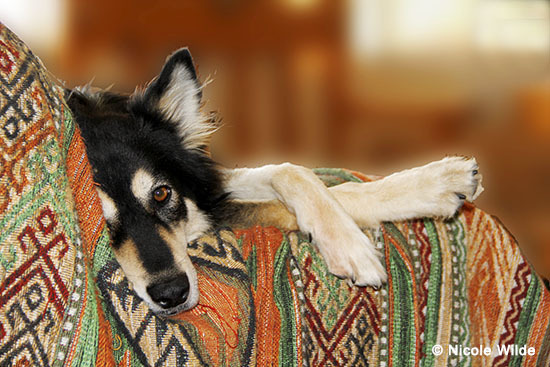 "We all know that the saying, "A tired dog is a good dog" implies that a dog who is tired is less likely to get into trouble. And the old adage is true. But while most owners accept that dogs need regular exercise to stay healthy and to cut down on over-arousal, a state of canine weariness can also be used for a specific purpose: to make behavior modification go more smoothly.
"We all know that the saying, "A tired dog is a good dog" implies that a dog who is tired is less likely to get into trouble. And the old adage is true. But while most owners accept that dogs need regular exercise to stay healthy and to cut down on over-arousal, a state of canine weariness can also be used for a specific purpose: to make behavior modification go more smoothly.
Dog-centric television programs spotlight dogs with behavioral issues -- aggression toward other dogs, snapping when having nails trimmed, or separation anxiety, to name a few -- and then show the trainer working with the dog to solve the problem. What many viewers don't realize, though, is that before that final, successful, on-air session, many things have already happened. And you can bet that one of the first was taking the edge off the dog's energy levels.
A dog who is a bit worn out is less likely to be reactive. Think of it this way: When a body's got a lot of energy stored, it has to be expressed in one way or another.
It's the same for dogs and people. I live near Los Angeles and I can tell you that when someone cuts me off in traffic, I'm not a happy camper. But my reaction is a whole lot different depending if, let's say, I just came from the gym and I'm pleasantly worn out, versus having a stressful day that did not include any physical exercise. Getting back to dogs, when I adopted Bodhi, he had some pretty major on-leash reactivity issues toward other dogs. Nowadays, when we encounter another dog, he'll place himself by my side as I've taught him to do. But he still has a mild level of anxiety when passing one particular dog at the park, and will whine a bit whenever we pass him. The last few days, though, Bodhi hasn't made a peep. It's not that he's suddenly realized that black Labs aren't the embodiment of evil -- it's because by the time we encountered the dog, Bodhi was already tired from a few miles of hiking. Again, exercise took the edge off.
Dogs with aggression issues will be less reactive during behavior modification sessions if they've been well exercised first. Tiring a dog out won't solve the problem entirely, of course, but in many cases it allows for a foot in the door. Even with a problem like separation anxiety, starting with a dog who is pleasantly worn out can help. Back when Sierra and I were working through her separation issues, if I took her out hiking before I left the house, she was markedly calmer than if she hadn't been exercised. When I included this tip in my book Don't Leave Me! Step by Step Help for Your Dog's Separation Anxiety, more than a few people contacted me to say that they hadn't thought of exercising their dogs before they left the house, and that it helped immensely.
This might all sound like common sense, but I know very few owners who actually think this way. It's just not something we're taught. Even if a dog doesn't have a serious behavior issue, taking the offense on the exercise front can help. For example, before having people over for an evening visit, get your dog out for a nice, long session of walking, hiking, playing with other dogs, or doing whatever you both enjoy. Just don't amp your dog up with an activity like ball chasing, and then immediately put him in a situation where he might become reactive. Aerobic activity elevates adrenaline levels, and floods the bloodstream with other chemicals that can take a while to return to normal levels. As an experiment, try exercising your dog before visiting the vet or groomer, before having visitors over, or before a session of working on behavior issues. You might be surprised at the difference it makes.
Nicole Wilde is a canine behavior specialist and author. Visit her website nicolewilde.com. Follow Nicole Wilde on Facebook.
